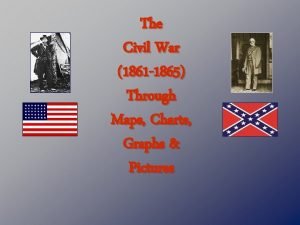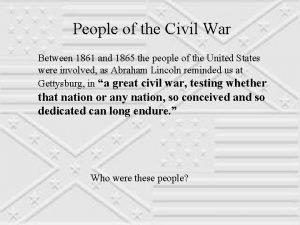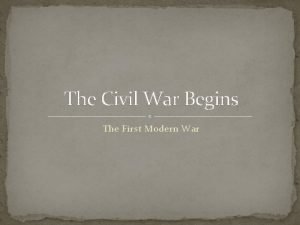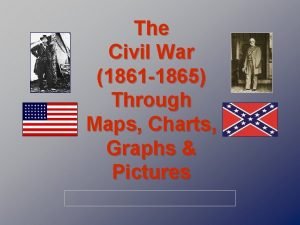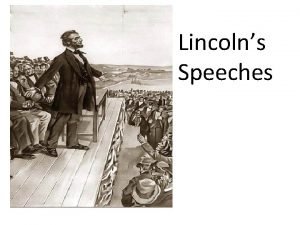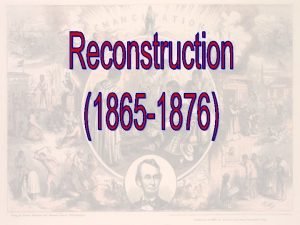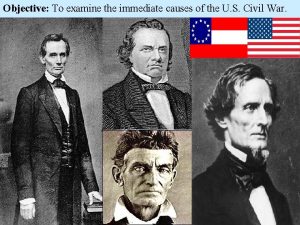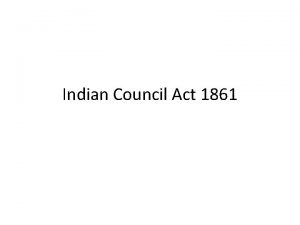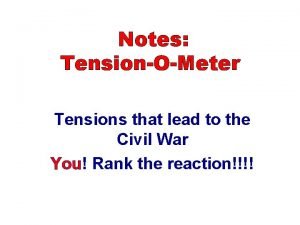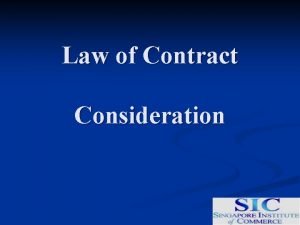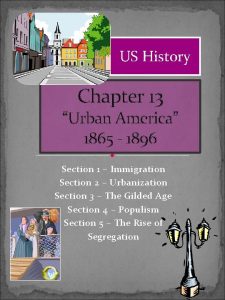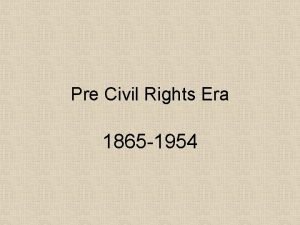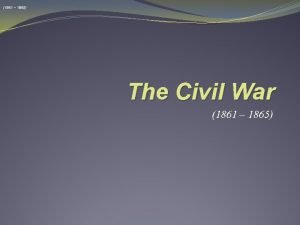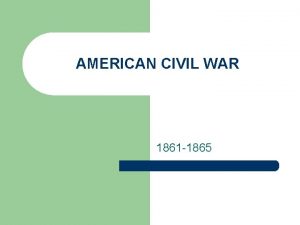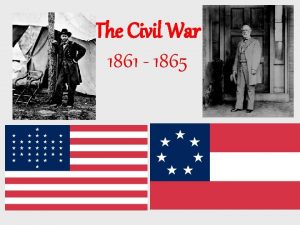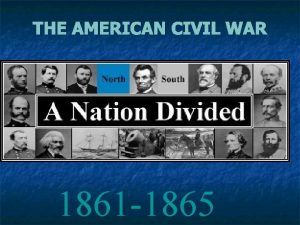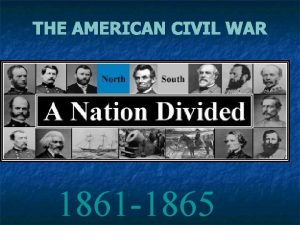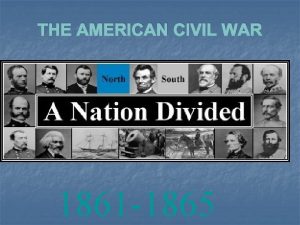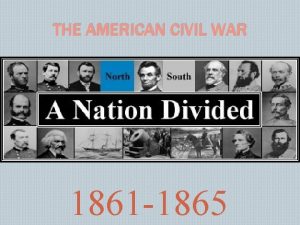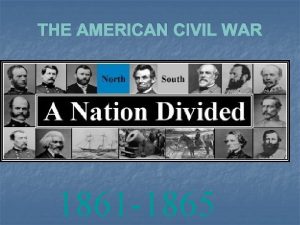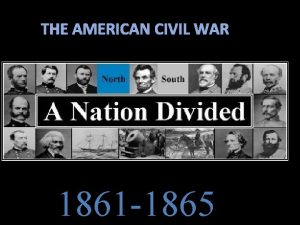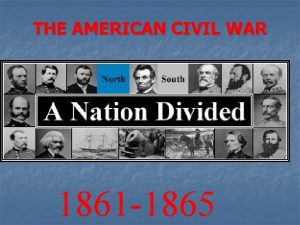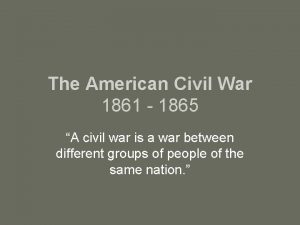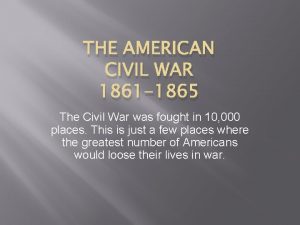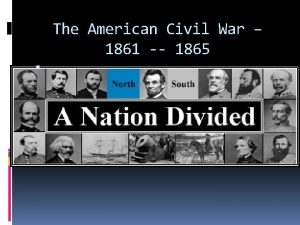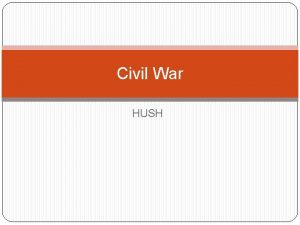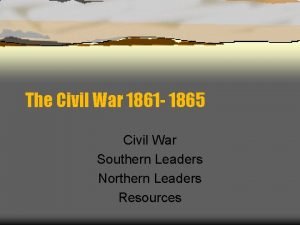The American Civil War 1861 To 1865 Lincolns




















- Slides: 20

The American Civil War 1861 To 1865


Lincoln’s Beliefs p No right to interfere with slavery where it existed p Secession illegal; Constitution formed by the people: no state can secede from the Union; Union is perpetual p No action until the South acts first

Fort Sumter: April 12, 1861

Waging War: Fight To Win p Preserve the Union: NOT to free the slaves -Don’t alienate border states -Maintain North’s support (issue of slavery) -Do not recognize So. secession (“domestic rebellion”)

Keep the Border States in the Union p Md. , Del. , Mo. , Ky. : slave states still in the Union p Would not push for emancipation until 1862

Take Charge of War Effort Tried to re-supply Ft. Sumter; South fired on fort p Called for 75, 000 volunteers to end rebellion p Increased size of navy & ordered naval blockade p Suspended writ of habeas corpus p Declared martial law in border states p


Paying for the War p Paying For War: n n New taxes on products & income tax Bonds were sold to raise $ 1863: a nation’s banking system changed: a new federal bank was created; new national currency backed by the US gov’t Money borrowed from banks

Confederate Money

Northern Advantages p p Advantages of the North: 16, 000 in army; Congress authorized spending for 500, 000 troops n Greater amount of industry n Better RR’s & roads, ports & harbors n Larger population (more workers & soldiers) n Control of navy n An established government in place under Lincoln

South’s Advantages p p p Fighting a defensive war: huge numbers volunteered Didn’t need to win, just hold on until the No. gave up Slaves could do the work while landowners could fight Well-trained officers – Robert E. Lee Fighting for their rights as states

Political Effects: North p Northerners (Rep. /No. Dem. s’) control Congress; pass key legislation: n n n Homestead Act Banking Act Pacific Railway Act Lincoln (Commander in Chief) exercises greater power: Sent troops to war on his own authority Increased size of army Suspended writ of habeas corpus

Political Effects: South p Formed a new government Recognize sovereignty of states n Makes abolition of slavery unconstitutional n 6 year term Struggle for power between states’ rights & centralization: States’ restricted Davis’ to impose martial law & suspend habeas corpus Gov’t imposed regulations on industry, took over RR’s & seized slaves for military work n

Confiscation Acts p Military hold slaves as “contraband” p Fall 1862: After Battle of Antietam, Lincoln announced his Emancipation Proclamation: Jan. 1, 1863

Goals Expand: Emancipation Deprive the South of a work force n Gain greater support from abolitionists and anti-slavery n Use African Americans to fight: organize black regiments and provide support for the Union n Prevent the South from getting foreign aid EFFECTS: n Encourages more slaves to leave plantations (a process that had already started) n Broader, more clearer purpose n Huge boost to Union n


Justification of Emancipation p “Military necessity” p Limited to wartime strategy p Who is freed and who is not:

Effect of Proclamation p Established a new purpose for the war p Symbolic: at first no slaves freed p Lessened the chance Europe would aid South

Human Cost of War 3 million + Americans fought in it p 600, 000 died p Worst single day: Antietam: over 3, 000 dead p Shiloh: 7, 000 men fell in 20 min. p Many died from battle wounds that became infected during the war p
 Civil war 1861/1862
Civil war 1861/1862 Civil war 1861/1862
Civil war 1861/1862 Regionalism in literature
Regionalism in literature Why was the civil war the first modern war
Why was the civil war the first modern war Toward civil war lesson 3 secession and war
Toward civil war lesson 3 secession and war American civil war battles map
American civil war battles map Lincolns speeches
Lincolns speeches Lincolns election date
Lincolns election date Lincolns election
Lincolns election Lincoln's 10% plan
Lincoln's 10% plan South carolina 1861
South carolina 1861 India council act 1861
India council act 1861 Springfield model 1861 rifle facts
Springfield model 1861 rifle facts Tensionometer
Tensionometer Unionistička stranka 1861
Unionistička stranka 1861 Hartley v ponsonby
Hartley v ponsonby Civil rights and civil liberties webquest
Civil rights and civil liberties webquest Urban america 1865 to 1896
Urban america 1865 to 1896 1865 to 1900 inventions
1865 to 1900 inventions How did the term impressionism originate
How did the term impressionism originate 15 th ammendment
15 th ammendment
